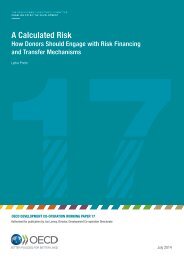UNIVERSITY
Livelihood_resilience_working_paper22
Livelihood_resilience_working_paper22
Create successful ePaper yourself
Turn your PDF publications into a flip-book with our unique Google optimized e-Paper software.
Recommendation 2: <br />
Address the root causes of vulnerability to allow for resilient livelihood systems xliv <br />
Local livelihood systems are dynamic and complex and include the resources humans rely on to live. <br />
These include, for example, freshwater, arable land, favourable climates, social networks, education <br />
opportunities, physical infrastructure, telecommunications and financial assets. <br />
When drafting global policy frameworks, attention needs to be drawn to structures and norms that <br />
influence and control access to these resources or which restrict transitions to more resilient <br />
livelihoods. <br />
Current efforts to build resilience to climate change and disaster risk are being undermined by our <br />
lack of consideration of the root causes of vulnerability. Examples of root causes of vulnerability are: <br />
-‐<br />
-‐<br />
-‐<br />
Social norms or governance dynamics that marginalise women and prevent their access to <br />
decision-‐making processes. <br />
Local power relations that provide conditions for ‘elite capture’ or restrict people’s access to <br />
natural resources that are crucial for sustainable livelihoods. <br />
Unequal distribution of land and other livelihood assets in rural communities. <br />
Inequalities, whether relating to voice and power, resource access and landlessness, or a <br />
combination of these can create conditions in which certain people get trapped in cycles of poverty <br />
and vulnerability. Without understanding and addressing root causes of vulnerability, there is a high <br />
risk of failure in development policy, climate change adaptation and disaster risk reduction. <br />
Moreover, a failure to address root causes of vulnerability in these policy arenas can further <br />
marginalize people and worsen their livelihood conditions. <br />
xliv This recommendation was originally drafted by Karen McNamara, Roger-‐Mark de Souza, Laura Olson and Vivek Prasad <br />
during the second Resilience Academy and subsequently edited by Sonja Ayeb-‐Karlsson, Thomas Tanner, Kees van der <br />
Geest and Koko Warner who take full responsibility for the content.



